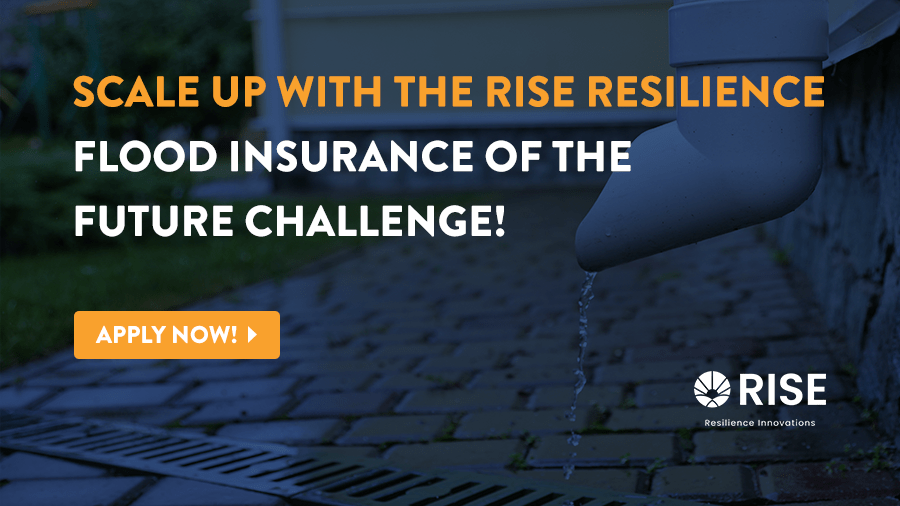Do you have questions about the RISE Resilience Flood Insurance of the Future Challenge? Attend the next webinar & look out for the session with Scott Williamson, Senior Vice President at the Reinsurance Association of America, and RISE Executive Director Paul Robinson, on Thursday, 1st December at 2 pm EST. The discussions will focus on the Community Disaster Resilience Zone Act, the bipartisan legislation that will designate communities most at risk from natural hazards, and how it will help direct public and private funds to meaningful resilience projects. Scott will also discuss the NFIP Risk Rating 2.0 and how it affects the current flood insurance environment.
RISE is a non-profit, economic development organization that accelerates innovation and business growth around solutions to coastal communities’ most intractable problems. Through its Challenges, more than 300 entrepreneurs and businesses from across the globe have competed to join RISE’s comprehensive program and win a funded pilot project using coastal Virginia as a living laboratory to test and refine their climate tech solutions. RISE acts as a “one-stop shop” for innovative solutions by identifying pilot sites, coordinating installation, developing an evaluation plan, and facilitating business development. To address the gaps between flood risk and protection, RISE Resilience is launching the Flood Insurance of the Future Challenge.
Does Your Solution Help Reduce Flood Insurance Protection Gaps?
As current insurance strategies struggle to accurately identify, minimize and cover the risk to properties that are increasingly susceptible to flooding, RISE is looking for solutions that have the potential to reduce flood insurance premiums and payouts by 50%.
To achieve this, RISE Resilience has identified multiple topic areas as suggestions to companies including new sources of capital and approaches to insurance, linking risk mitigation solutions to reduce risk transfer costs, and enhancing accuracy and granularity of data and processing capabilities.
Implement Your Solution in Real World Pilot Testing Sites
All the winning solutions must be implemented in the Hampton Roads region of Virginia. This region provides a unique testbed for the development and demonstration of solutions for the RISE Resilience Flood Insurance of the Future Challenge since:
- It is the location of many current and planned resilience projects.
- The regional cities are proactive in hosting and assessing new resilience technologies and approaches.
- RISE has extensive experience in developing and running resilience Challenges in this region.
Explore the Benefits of Joining the RISE Resilience Flood Insurance of the Future Challenge
Since 2018, RISE has deployed over US $6 million to more than 35 businesses developing new, scalable products and services that help coastal communities adapt to climate change impacts. RISE provides selected companies with technical, government, and business mentors, investor matchmaking, customized accelerator curriculum, and ongoing support to get their businesses to the next level while solving communities’ resilience needs.
If selected, RISE will support your business in the following ways:
- Access to the Resilience Innovation Fund (non-equity, non-dilutive)
- Access to the Resilience Innovation Accelerator
- Access to real world datasets, testbeds & pilot sites
- Fabrication & testing spaces
- Co-working office spaces
- Regulatory & permits support
- Become a part of an established resilience community
- PR and media visibility
- Strategic collaborations with experts and stakeholders
What’s more, RISE offers variable funding awards to both single companies (up to US $300K) as well as teams of companies (up to US $750K) developing integrated solutions. Call your partners today!
What Type of Solutions Is RISE Looking For?
Apply for the RISE Resilience Flood Insurance of the Future Challenge if you work on solutions that:
- Offer new sources of capital and approaches to flood insurance.
- Integrate with resilience infrastructure projects underway or planned in the Hampton Roads region, resulting in a reduction in risk and insurance costs. This includes assessing current resilience projects for their impacts on insurance, as well as proposing or guiding future projects.
- Build on past or current flood insurance program approaches — for example, community-based or parametric, to demonstrate effectiveness on a city-wide basis.
- Some insurance approaches require measurement data in order to trigger a payout. There is a need for accurate and reliable measurement data and processes to accurately and reliably characterize the event which triggers the payout.
- Assist municipalities in reducing flood insurance premiums on a community-wide basis (for example, through a Community Rating System).
- Develop data, analysis, or modeling, to support and enhance insurance premium and payout reduction efforts. Some examples include:
- Parcel-by-parcel information of properties (e.g., first-floor elevation, construction, flooding mitigations, etc.)
- Critical infrastructure and other parameter mapping and cataloging to guide and improve the calculation of insurance costs.
- Products and processes to reduce fraud-related costs to insurance companies. This may include improved processes to detect fraud, prevent future fraud, and deal with fraudulent claims and practices more efficiently.
- Designs and plans for communities in Hampton Roads to establish Community Disaster Resilience Zones (CDRZ). These zones have been proposed as a federal structure that directs public and incentivizes private-sector funding for resilience projects to communities most in need and most at risk from significant natural disasters. CDRZ communities would be provided a menu of funding and financing options to pay for resilience projects to better protect them against significant natural disaster risks.
This Challenge seeks solutions to be applied to specific planned efforts in Hampton Roads communities, for example, the “Ghent to Harbor Park Flood Protection Program” planned with the USACE in the City of Norfolk, as well as focuses on those activities required to meet the Challenge goals.
Submissions will be considered in areas other than those described above if the achievement of the Challenge goal can be demonstrably met.
RISE Focuses on Supporting Companies That Help Tackle Climate Change
RISE has initiated more than 30 novel pilot projects to solve the climate challenges that coastal communities face today. Examples include:
- The world’s first integration of flood modeling technology with Waze offers drivers real-time alerts to help them navigate flooded roads.
- The nation’s first Home Raising Academy piloting workforce training and certification in the home elevation industry.
- Mobile manufacturing units that produce affordable shoreline protection structures to mitigate flooding faster and safer.
- Stormwater monitoring software and sensors that give real-time analytics and alerts to prevent flooding, decrease costs, help prioritize retrofits, and plan future infrastructure projects.
______
Sharing is Caring!


